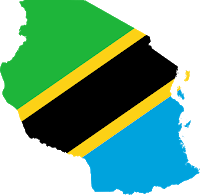TANZANIA: African Child DAY; TEC implements Child Protection Policy

Sarah Pelaji & Dalphina Rubyema
As the country joined various nations in celebrating the Day of the African Child, the health Department of Tanzania Catholic Episcopal Conference (TEC) has said that acts of violence against children will end if the decision-making bodies work on assuring confidentiality to protect informants.
This was stated by the Coordinator of HIV / AIDS issues TEC Department of Health, Mr. Norasco Tareba in an exclusive interview with AMECEA Correspondent in Kurasini in Dar es Salaam, where he said despite his office providing training to various stakeholders on the whole issue of child protection and how to expose acts of violence against children, some of them have been afraid to provide such information to the relevant agencies as a result of the death threats by the suspects.
“When some stakeholders, especially community-based health workers, raised cases of violence and brought them to the attention of the authorities, they receiving death threats, especially when the suspect is arrested and interrogated. This is due to lack of confidentiality to protect the informant,” he said.
Other challenges mentioned by Mr. Tareba include stigma against children who are abused. Once they are identified, the community begins to ostracize them, sometimes calling them inappropriate names, a situation that affects one’s self-esteem and the victims’ willingness to testify.
Despite these challenges, according to the HIV / AIDS Coordinator, TEC through the Department of Health has already developed and implemented the Child Protection Policy and among its activities under the auspices of the Organization for HIV / AIDS Aerial Glaciers Pediatric (AGPAHI) through the Interfaith Cooperation in Tanzania (TIP), is to train various stakeholders including religious leaders, community workers, youth and teachers of various schools through the Coaching Boys into Men program ( CBIM). The targeted number of trained stakeholders is approximately 451.
“The project has involved various stakeholders including religious leaders, social workers including the gender desk, the police, legal assistants, traditional leaders, civil servants and the private sector and it is currently being implemented in the Catholic Diocese of Mwanza and Tanga,” he said.
He added, “The main role of volunteer social workers is to expose acts of violence against children and ultimately the cases they raise are appealing to decision-making bodies. We also use the faith-based media and secular, to provide protection education of a child. ”
In another step TEC is implementing the Child Protection Policy in the manner in which Mr. Tareba described as a ‘Mobile-One-Stop-Centre’ and explained that it was a step towards having a single service centre where there were all key stakeholders in dealing with cases of violence against children, including police, lawyers and judges.
“This has brought success as it removes the chain of issues as when a child is brought to the centre, all evidence steps are taken directly to all stakeholders,” he said.
In addition to Mwanza and Tanga, TEC through the Department of Health has implemented a similar project in the Diocese of Kigoma, Bunda and Musoma in Mara region.
Every year on 16 June, Tanzania joins other African countries in celebrating the Day of the African Child. The 2021 African Children’s Day celebrations come as child rights activists mourn the death of an eight-year-old boy, in Mpirani Village, Same District, in connection with an alleged rape by an unknown man on June 16 this year. His body was found in a bush with his private parts mutilated.
The Origin of the African Child Celebration is a Declaration adopted by the then Organization of African Unity (OAU) in 1990 to commemorate the children of the Soweto suburb in South Africa who were killed on June 16, 1976 as a result of apartheid. The children were claiming their right to non-discrimination as well as other human rights including the right to a quality education, thus opposing discriminatory education systems.
Following this event, the OAU decided that June 16 of each year should be the Day of the African Child. Through this commemoration, the government and other stakeholders are reminded to develop concrete plans for the development of children and to raise awareness of parents, guardians and communities about solving the challenges facing African children and finding solutions.


